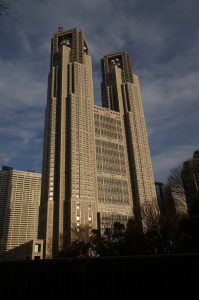Now, I’m thinking about these three reasons why the top of Japan cannot take a policy that benefit Japanese people over the medium to long term. First, we talked about the super left media and education, and yesterday we talked about Jewish/ American global financial capital.
Today is the last reason, about public officers in Kasumigaseki. Kasumigaseki is a district where most of ministries are in the central Tokyo. Ministers change frequently and most of them are not professionals with a lot of knowledge and experience in that field. Thus, of course, there are distrust with bureaucrats, and those minsters can’t even take top-down approaches. Even though Japan has laws and regulations passed by the Diet, administrative guidance issued by ministries are more effective and practical, so there is no choice but to make politics reflect the thoughts of Kasumigaseki officials.
Fundamentally, I think Japanese history has affected to create current bureaucracy.
I also think the first bureaucracy created by the Meiji Restoration. Saigo Takamori also mentioned, that in the Meiji Restoration, those who worked hard were rewarded with those minister posts. So from the very beginning, those posts were not selected based on the capability or career, rather they were driven by political reasons.
This trend has not changed. The leader who ultimately has taken the power assigns personnel, as a so-called reward, medal or prize, or to maintain his political power balance in the cabinet.
I think this is a major difference from Taiwan’s response to this COVID 19 pandemic. The minister, who came out his nature, are very strong in IT. Personally, the IT genius like him would not be able to be selected as the top technology minister in Japan. Taiwan prime minister simply focused on their abilities and experience and select the right person for a position from the human resource pool.
I think it is necessary to take a closer look at the background behind the Meiji Restoration. I personally believe that there was probably some deal between Meiji Restoration patriots and their sponsors. Those sponsors are unlikely to be Japanese but foreign capital who might have got huge benefit from the regime change.
Although the Meiji Restoration is certainly completed by Japanese hands, I think there are some people who are backing up financially. And I guess it’s like, “You know, by the time you take power, never fail to get us rewarded!”
I think that this kind of influence has been seen in the present era as well. The educational background of the country’s leading elites has mainly influenced them. After that, most of them graduate from a so-called top university in Japan. However, I think there are many people who receive much higher education in the United States as part of their careers. This is an opportunity to deeply engage with the major financial capitals of the United States and Europe that I mentioned as the second reason earlier. Those elites have opportunity to absorb those capitalist’ views.
After receiving the education of the far left, building an elite position in Japan, and going abroad, he may say, “Well, we are the world leader, you must understand” they may be snobbish and arrogant . Or, they may say :” I was stupid with such an idea to improve Japan with my own power, wouldn’t it be smarter to manage my career safely and shifting to other private company’s top management position as a former government officer?

In particular, when the postwar left-hand philosophy became widespread, the regulations seemed to be tighter and tighter to show authority and dignity. This is also a great deal of pressure, and stands as a wall when a nation’s leaders seek leadership for the sake of their people.
I heard the above story.
It is difficult to explain why the top of Japan cannot take the best policy in the medium to long term, for the sake of the Japanese people. I think the three factors described so far are intertwined. The thing to be aware of is not just external pressure. I think the trigger was certainly external pressure, but that combined with the psychological and behavioral actions of a homogeneous people Japanese.
These three barriers appear and make turns in front of the top of Japan , and double or triple with each other, leading Japanese leader to fail to take the best decision. The problem is not easy.
Tomorrow I would like to talk about the attitudes underlying these issues. The title is “hospital diet” syndrome.










